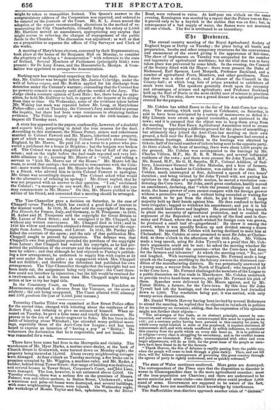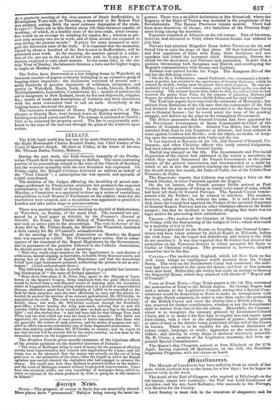Zbe Vrobtnres.
The annual country meeting of the Royal Agricultural Society of England began at Derby on Tuesday ; the place being all bustle and preparation, booths and other temporary structures for the convenience and amusement of the crowd giving it the appearance of fair-time. The show of implements on Tuesday was unequalled for the number and ingenuity of agricultural machines ; but the trial that was to have taken place was prevented by some hitch. In the evening, the Council of the Society dined with the Mayor : there were present the Duke of Richmond, Earl Spencer, Lord Morpeth, Professor Buckland, and a number of agricultural Peers, Members, and other gentlemen. Next day there was a show of stock, and a dinner of the Council in the County-hall ; at which long lists of prizes awarded to exhibiters of stock were read. The speakers generally dwelt upon the necessity and advantages of science and agriculture; and Professor Buckland held up the Earl of Ducie as the most skilful user of science iu practical farming. On Thu-sday, there was a grand dinner in a splendid pavilion erected for the purpose.
Mr. Cobden has added Essex to the list of his Anti-Corn-law victo- ries. The meeting, which took place at Colchester, on Saturday, is said to have been anticipated by a variety of manceuvres to defeat it :. fifty Liberals were sworn as special constables, and stationed in the town ; and it is assumed that the object was to keep them away from the meeting. The East Essex Agricultural Association tried to create a diversion by appointing a different ground for the place of assembling; but ultimately they joined the Anti-Corn-law meeting on their own ground, a field near the East Bridge. Here the Leaguers had erected a commodious hustings. Admission to the hustings was obtained by- tickets ; half of the total number of tickets being sent to the opposite party. At three o'clock, the hour of meeting, there were about 5,000 people on the ground. Mr. Cobden was accompanied to the hustings by Mr. Charles Villiers, M.P., Mr. R. R. R. Moore, and several influential residents of the town ; and there were present Sir John Tyrrell, M.P., Mr. Round, M.P., Sir G. H. Smythe, M.P., Colonel Addison, of Sud- bury, Lieutenant-General Sir John Malcolm, and a host of farmers. Mr. J. Bawtree, a banker in Colchester, was called to the chair. Mr. Cobden, much interrupted at first, delivered a speech of two hours' duration ; and being twitted by Sir John Tyrrell with not putting his opinions in the shape of a specific motion, he moved a resolution con- demning the Corn-laws. Sir John, amid great confusion, hastily moved an amendment, declaring, that "while the present charges on land re- main, the home grower of corn cannot compete with the foreign grower without a protective duty"; and, without being seconded or waiting for the motion to be put from the chair, he put it himself! A large majority held up their hands against him. He then confesed to likVing- been irregular ; begged to withdraw his amendment ; and put it in his pocket, amid loud cheers and laughter. He proceeded in a long speech to plead the necessity of agricultural protection, and to combat the argument of the Repealers ; and ale sample of the food used in Ger- many and Poland, where the much-wished-for foreign corn was grown, he produced a small loaf of—gingerbread! He threw it among the- crowd, where it was speedily broken up and divided among a dozen persons. He taunted Mr. Cobden with having declined to meet him at Chelmsford: Mr. Cobden at once promised to meet Sir John at Chelms- ford. at three o'clock in the afternoon of the 28th July. Mr. Villiers made a long speech, using Sir John Tyrrell's as a proof that Mr. Cob- den's arguments could not be met : he asked the meeting whether Sir John Tyrrell had settled the question—what the Corn-laws had done for the farmers and labourers ? At which the meeting cried, " No, no!" and laughed. With increasing interruption, Mr. Ferrand made a long attack on the League ; ascribing to the factory-owners the distressed con- dition of the manufacturing districts. He was perpetually answered by a young map, a weaver from the North of England ; who imputed it elf to the Corn-laws. Mr. Ferrand challenged the members of the League to a public discussion on free trade in Manchester. Mr. Cobden undertook to provide twelve hand-loom weavers, and give Mr. Ferrand his pick of them. Speeches were delivered by Mr. Moore against, and by Mr. Fisher Hobbs, a farmer, for the Corn-laws. By this time Sir John Tyrrell had left the hustings, and the numbers present had dwindled down to 2,000. The resolution being put, it was carried, with only twenty-seven dissentients.
Mr. Daniel Whittle Harvey having been invited by several Reformers to attend the meeting, he replied that he objected to reembark in politics for so transitory an occasion; adding, that the expression of his opinions might not further their objects-
" The advantages of free trade, as an abstract principle, cannot be con- troverted, and whatever checks its uninterrupted flow must be regarded as an evil ; yet a contrary policy having been pursued in this country for years, by which every social relation is more or less perplexed, it requires statesmen of consummate skill, and with minds unaffected by selfish influences, to extricate this country from the perils which on every side beset us. It is in politics ar in religion—every class is struggling for ascendancy, and in the conflict reason and justice are immolated. Free trade, unaccompanied with other and even larger adjustments, will do as little for the great mass of the people as cora- laws have been found to do for the farmers.
" Thank Heaven, the film of delusion is rapidly passing from the public eye;- when the people will cease to look through a glass darkly. Then, and not till then, will the hideous consequences of governing this great country through• the agency of party be rightly understood, and as quickly redressed."
The state of Wales continues unaltered. More gates are destroyed. The correspondent of the Times says that the disposition to disorder is worse in Glamorganshire than in the more agricultural counties : most of the iron-population are Chartists ; and there are understood to be secret societies and arms-clubs—one district alone could produce 5,000 stand of arms. Government are supposed to be aware of the fact, though they have not manifested their knowledge by interference.
The Staffordshire iron-districts approach another crisis of "distress."
At a quarterly meeting of the iron-masters of South Staffordshire, in Birmingham Town-hall, on Thursday, a memorial to Sir Robert Peel was adopted, setting forth the most extreme depression of the trade. It says—" There are in this district about 139 blast-furnaces capable of working; of which, in a healthy state of the iron-trade, about twenty- five would on au average be standing for repairs, &c. ; whereas at pre- sent only seventy-two are at work, and of these several are expected to stop during the present month." It prays for some measures to miti- gate the distressed state of the trade. It is expected that the memorial, signed by about a hundred of the first houses in Staffordshire, will be presented next week. At the meeting, the masters agreed to a reduc- tion of 10s. per ton in the price of bar-iron, and 5s. in pig-iron ; a re- duction expected to ruin small makers. In the mean time, in the dis- trict West of Dudley, the labourers threaten a turn-out for higher wages, to begin on Monday next.
The Police have discovered at a low lodging-house in Wakefield, an immense number of papers evidently belonging to an extensive gang of begging-letter impostors : the documents consisted of several sets— many hundreds of genuine signatures of noblemen, clergymen, and gentry in Wakefield, Heath, York, Halifax, Leeds, Lincoln, Norfolk, Nottinghamshire, Lancashire, Cumberland, &c.; models of petitions for aid to emigrants to New Zealand, losers by fire and shipwreck, cripples, Sm. ; routes of roads and descriptions of residents and their characters, with the most convenient time to call on each. Everybody at the lodging-house disowned the papers. The extensive warehouses of Messrs. Nightingale and Co. of Man- chester, at Granby Row, were burned down on Monday morning. The building contained cotton and flour. The damage is estimated at 10,000/. ; 7001. to be deducted for property saved. The fire is conjecturally attri- buted to the rays of the sun cast through the glass of the windows upon -cotton.



























 Previous page
Previous page